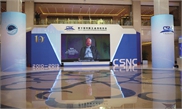The act sent shock waves along the supply chain of the global semiconductor industry, sparking strong sell-offs in semiconductor companies’ shares worldwide. The same was seen in Malaysia, which caused the Bursa Malaysia Technology Index to sink 3.47% on Tuesday — the biggest loser among the indices — led by companies linked to the industry.
But it may not be a losing battle in the long run, at least not for Malaysian companies. The trade diversion that will arise from Huawei’s ban in the US, which effectively cuts off US chipmakers from the supply chain of Huawei — the world’s largest provider of networking gear and the second-largest smartphone vendor — may benefit domestic players here.
Pentamaster Group Bhd co-founder and chairman Chuah Choon Bin told The Edge Financial Daily that he expects the group’s telecommunications segment to see a 20% to 30% decline in sales as a result of Huawei’s blacklisting in the US. The contraction may take away some 18% in total sales it anticipates for the year.
However, Chuah said Pentamaster may also stand to benefit from the ban, as he expects China will become more aggressive in ramping up their product developments in the face of what happened to Huawei.
So, he sees a silver lining for the group in the form of trade diverted from US chip suppliers to those located elsewhere, possibly in Malaysia, where Pentamaster supplies chip tester equipment or automated tester equipment.
As such, Chuah does not expect Pentamaster to be greatly affected by Huawei’s ban in the US. In fact, the eventual tally may show Pentamaster gaining from the situation.
Pentamaster was among the technology counters on Bursa Malaysia that took a beating on Tuesday, following the news on Huawei’s ban.
Its shares sank as much as 29 sen on Tuesday to RM4.05, before easing to settle at RM4.10, down 24 sen or 5.53% at market close. It was one of the top losers in Bursa Malaysia’s Technology Index, which retreated to 30.9 points, dragging the FBM KLCI down 0.1% to close at 1,603.74.
Other semiconductor stocks that were badly hit include: Inari Amertron, which fell 10 sen or 6.67% to RM1.40; Mi Technovation Bhd, which was down 11 sen or 6.43% to RM1.60; Globetronics Technology Bhd, which retreated 10 sen or 5.92% to RM1.59; and Frontken Corp Bhd, which fell eight sen or 5.63% to RM1.34.
Nonetheless, the rebound on Wall Street among semiconductor stocks that were bogged down by fears over the trade war’s ripple effects, raised hope that its peers in Malaysia may follow suit, if the upward trend seen on Tuesday is sustainable.
The share price recovery was fuelled by the temporary 90-day reprieve that was granted to Huawei on Monday. The initial ban was to take effect on May 20. The Philadelphia Semiconductor Index gained 2.1% to end a three-day slump on Tuesday.
“The disruption to (the) supply chain will definitely be negative in the short term,” said an analyst who tracks the semiconductor industry, citing as example people who are considering switching mobile phones after the news that Alphabet Inc’s Google would be cutting off the supply of hardware and selected software services to Huawei once the 90 days is up.
“The trade war seems like breaking the supply chain into two ... this is going to be bad in the short term. But if China cannot get their supply from the US, they are likely to turn inwards ... [or to] countries like Malaysia,” the analyst added.
A Singapore-based fund manager commented that Malaysian tech companies presently do not have much to do with Huawei. But the ban is causing everyone in China to sit up and rethink their supply chain strategy. “In short, no one will believe in the US [anymore]. It is not a reliable and credible supplier. What it means is that it is positive for some of those tech companies in Malaysia that can offer what the Chinese need,” he said.
Some analysts, however, have a more cautious stance, saying it is too early to draw any conclusions on the matter given that it is hard to predict any retaliatory moves the two countries could make. The lingering concern remains that any slowdown in international trade volume will not augur well for the world economy, including Malaysia. Meanwhile, some have pointed out that the valuation of Malaysian semiconductor stocks are relatively higher compared with elsewhere.
Read more:
 US-China trade war a boon
US-China trade war a boon
Pentamaster still confident of another record earnings year
Related posts:
https://youtu.be/hRv0QMEwdas https://youtu.be/dtT0rHgJ9-I 《今日关注》是CCTV中文国际频道播出的时事述评栏目。该栏目紧密跟踪国内外重大新闻事件,邀请国内外一流的专家和高级官员梳理新闻来龙去脉,评论新闻事..
























